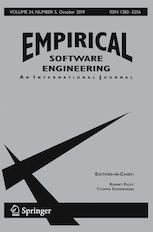Empirical Software Engineering - An International Journal
Editor-in-Chief: Robert Feldt; Thomas Zimmermann
ISSN: 1382-3256 (print version)
ISSN: 1573-7616 (electronic version)
Journal no. 10664
Facebook: facebook.com/emsejournal
Twitter: @emsejournal

Call for Papers — EMSE Special Issue on “Collective Knowledge in Software Engineering”
A special issue of the Empirical Software Engineering Journal.
Editors of the Special Issue
- Shaowei Wang, (Mississippi State University, USA), wang@cse.msstate.edu
- Tse-Hsun (Peter) Chen, (Concordia University, Canada), peterc@encs.concordia.ca
- Sebastian Baltes, (The University of Adelaide, Australia), sebastian.baltes@adelaide.edu.au
- Ivano Malavolta, (Vrije Universiteit Amsterdam, The Netherlands), i.malavolta@vu.nl
- Christoph Treude, (The University of Adelaide, Australia), christoph.treude@adelaide.edu.au
- Alexander Serebrenik, (Eindhoven University of Technology, The Netherlands), a.serebrenik@tue.nl
Description of the Special Issue
Knowledge-sharing platforms, such as Stack Overflow, GitHub, Twitter, and Slack, have changed how developers share knowledge and seek information on the web. These platforms store a significant amount of collective knowledge that is contributed by a large and rapidly-evolving group of participants. For instance, Stack Overflow provides a question and answer (Q&A) platform for developers to share programming-related knowledge. As of 2020, more than 12 million developers from around the world have contributed to Stack Overflow. Through such a collective model, Stack Overflow has accumulated a tremendous amount of knowledge, including more than 19 million questions, 29 million answers, and 74 million comments. As another example, GitHub has accumulated more than 61 million software project repositories that are developed by more than 20 million developers. Developers collectively contribute various types of knowledge such as source code and issue reports that provide rich information to assist future software development. In addition to Stack Overflow and GitHub, developers also commonly share their knowledge on social media and communication platforms, such as Twitter and Slack. This massive amount of collective knowledge could be leveraged to significantly benefit the software engineering community. In fact, many recent studies leverage such collective knowledge (e.g., from Stack Overflow, GitHub, and Twitter) to uncover empirical evidence or develop research techniques to further improve the software development process and quality assurance practice. The empirical findings and techniques have shown great success in addressing various software engineering problems (e.g., code generation, code recommendation, debugging and repair, and API documentation enhancement). Therefore, collective knowledge in software engineering has attracted great attention in the software engineering and other research communities (e.g., data mining and AI).
We invite the submission of high-quality papers describing original and significant work in all areas of collective knowledge in software engineering, including but not limited to:
- Improving the sharing and management of collective knowledge;
- Approaches and techniques for knowledge discovery from collective software engineering knowledge; and
- Leveraging collective knowledge to facilitate software engineering tasks.
The evaluation of papers will be based on:
- Underlying methodological soundness and rigor
- Novelty of the work
- The quality of the reporting
- Strength of empirical evaluation/basis
- Significance and reproducibility of the results
Submission Topics
- Techniques or empirical studies for improving the quality and management of collective knowledge, e.g., maintain insecure/obsolete code examples on Stack Overflow or GitHub
- Techniques or methods for improving the creation/sharing of collective knowledge, .e.g., constructing knowledge graph for SE
- Analyzing human factors in the quality and maintenance of collective knowledge, e.g., onboarding in open-source projects
- Techniques for synthesizing information from collective knowledge, e.g. by summarizing it
- Incentive systems for the contribution of collective knowledge, e.g., reputation scores, bounties, or donations
- Leveraging collective knowledge for developing recommender systems
- Authorship and reuse in collective knowledge
- Analyzing/leveraging collective knowledge for software development and reuse
- Analyzing/leveraging collective knowledge for software maintenance and evolution
- Analyzing/leveraging collective knowledge for debugging and testing
- Analyzing/leveraging collective knowledge for SE artifacts generation, e.g., code, comment, or summary
- Analyzing/leveraging collective knowledge for better understanding the dynamics of software ecosystems, e.g., Python, NPM, or Unix packages
Schedule
- Submission Deadline:
November 30December 15, 2020 - First Round Review Due:
Feburary 28March 15, 2021
Submission Instructions
Papers should be submitted through the Empirical Software Engineering editorial manager website (http://www.editorialmanager.com/emse/) as follows (1) select “Research Papers” and (2) later on the Additional Information page:
- Answer “Yes” to “Does this paper belong to a special issue?”
- And select “Collective Knowledge in Software Engineering” for “Please select the issue your manuscript belongs to”.
- In the cover letter, please explicitly explain why the submission fits with the special issue.
For formatting guidelines as well as submission instructions, visit http://www.springer.com/computer/swe/journal/10664?detailsPage=pltci_2530593